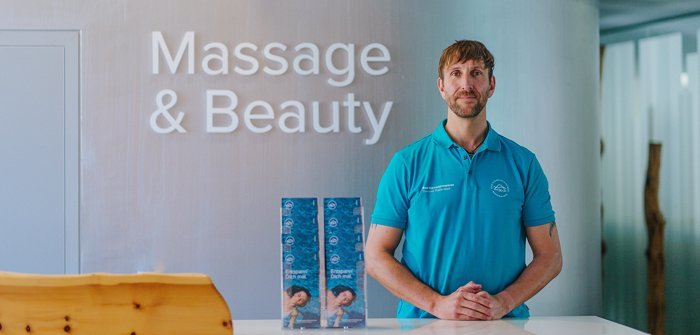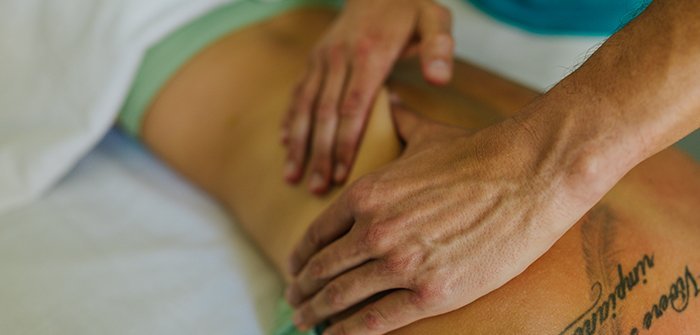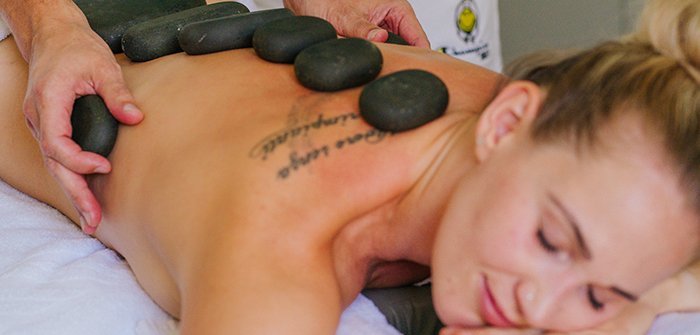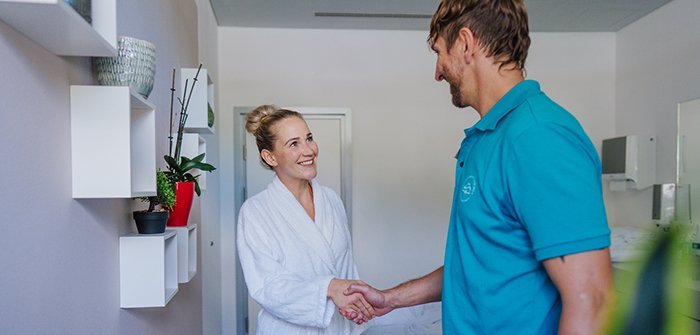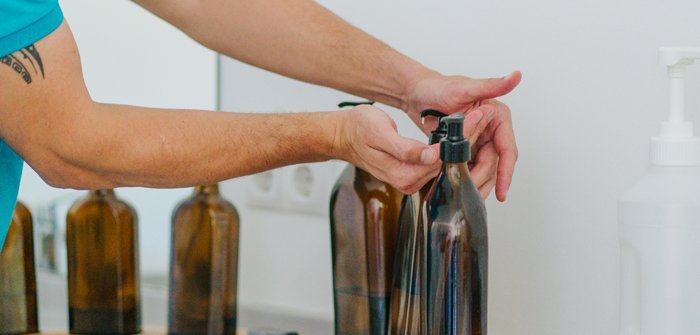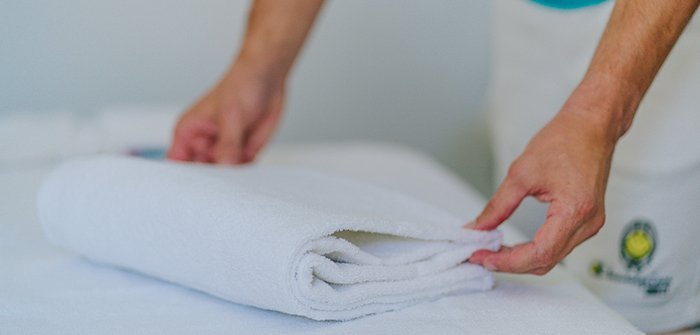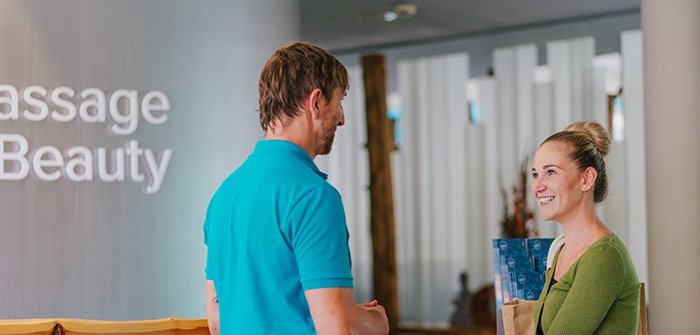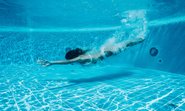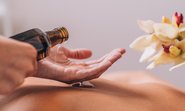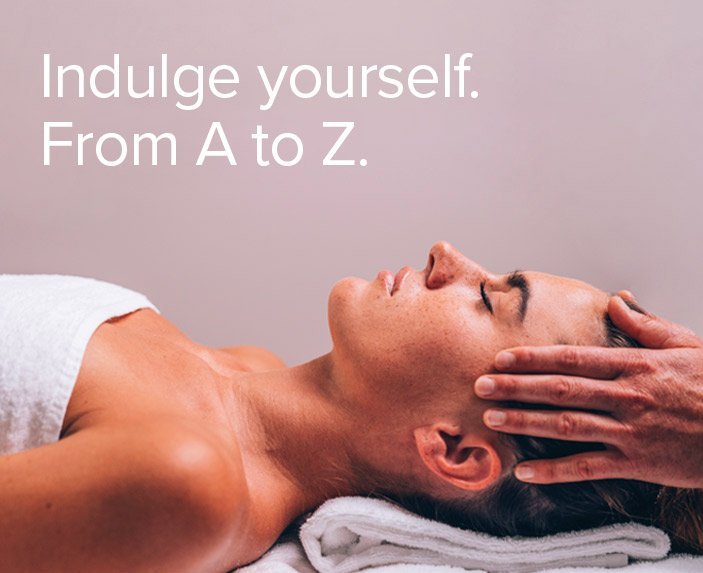Finding the right spot: A day in the life of a massage therapist at the Thermal Römerbad
Whether you like relaxing strokes and blissful tapping or having your muscles kneaded vigorously – massage comes in many kinds and techniques. And all of them contribute to maintaining overall physical well-being. After undergoing a treatment at the seemingly magic hands of massage therapists, we feel reborn. But what’s behind this enjoyable experience in the first place?
I’m Oliver – a massage therapist at the Thermal Römerbad. Today I'll be giving you an insight into my job, how I got into it in the first place and what my typical working day looks like. Come join me at the massage table!
Love at second sight.
My career path didn’t start off next to the massage table, but in sales. From apprenticeship to sales manager, I worked for 25 years and in a wide variety of industries. But at some point, I simply wasn’t enjoying it anymore.
I was an active athlete in elite kickboxing at the time, so I was always enjoying massage treatments. I quickly recognised just how incredibly valuable massage can be as a form of therapy, especially following an injury. This had a lasting effect on my attitude to the human body.
Then in 2019, I decided to shake up this part of my life. I started training as a medical massage therapist at the WIFI and at the same time as a certified fitness and health trainer at the Vitalakademie. I also trained as a clinical massage therapist in 2021. Since then I’ve been working as a massage therapist at the Thermal Römerbad as well as at my own practice.
The training.
In order to work as a massage therapist in Austria, you need to take a three-year, staterecognised training programme. In Carinthia, for example, you can complete this as an apprenticeship at the Fachberufsschule Klagenfurt 2 vocational college, which is also doable as a dual apprenticeship in combination with cosmetics or podiatry.
However, trained massage therapists are only allowed to perform massages on healthy people. When it comes to providing massages as medical treatment, you have to complete special training as a medical massage therapist or clinical massage therapist. If you want to do both, combination training as a commercial and medical massage therapist is best – after that you’re allowed to perform massages for disease prevention as well as in the medical and therapeutic field.
What about after the training?
Training to become a qualified fitness and health trainer was a valuable extra for me. At the end of the day, it’s very important in the therapeutic profession to know what each muscle does and how muscular imbalances can be corrected. And when you become a clinical massage therapist, you’re able to offer a whole portfolio of additional treatments. Depending on the clinical picture, practices such as foot reflexology, lymphatic drainage or connective tissue massage are then available to your clients.
But what’s most important is constantly wanting to develop, staying thirsty for knowledge and open to new things – such as new techniques or new equipment.
What makes up the profession of massage therapist?
Close personal contact is always in the foreground in the profession of a massage therapist – from the pre-treatment conversation, to analysing and outlining the necessary therapy, to the treatment itself. Good knowledge of human nature and the ability to focus in on clients’ wishes and complaints are also particularly important in this line of work.
Interested in training as a massage therapist yourself? This career would suit you if you already have the following qualities:
- A healthy mind in a healthy body. There’s no point in being in good shape physically if you’re struggling mentally. However, massage treatments are just as good for your mind as they are for your body. In particular, you shouldn’t underestimate the physical aspect, i.e. the daily strain of standing and using your hands.
- Being personable as well as personal. Sociability, understanding and empathy should also be some of your strengths – both in conversation and during the actual treatment.
- Discretion please. The issue of confidentiality and discretion is particularly important for all medical or therapeutic professions. This means you should be able to professionally handle the information entrusted to you.
- Social skills. As in all professions, however, helpfulness, cleanliness, friendliness, punctuality, resilience and communication skills are essential, of course.
Tip: Dedicate enough time to your training. This is especially important if you’re interested in massage training to set out on a second career path. The public sector offers a lot of support options for this – from educational leave to partial reimbursement of your training costs.
A day in the massage centre at the Thermal Römerbad.
My typical daily routine at the Thermal Römerbad massage centre starts with organisational tasks – starting up the cash register system, counting change, checking appointments and workload. Making sure the massage room is sufficiently clean is also part of the process. I also regularly check the stock of massage equipment, such as oils and towels. I usually have some time before the first client comes in, which I use to answer enquiries and make appointments.
By the way: The massage and beauty centre at the Thermal Römerbad is open daily from 12.00 noon to 8 p.m. A massage usually lasts 25 or 50 minutes.
Tips for your (first) massage.
Maybe you’ve enjoyed a massage treatment before. Or maybe it’s your first visit to the Thermal Römerbad. Before you relax completely, I’ll ask you a few questions about your current wellbeing, pre-existing conditions, medications, allergies and if you’re pregnant.
Important: Massage should not be performed if you have an acute, inflammatory issue (e.g. fever, tendon-muscle-nerve pain), thrombosis or relevant contraindications (e.g. cancer, depression, pre-existing heart condition, etc.), but also during the first twelve weeks of pregnancy. If you’re unsure, seek precautionary medical advice.
Ready to relax? Super. In order to get the most out of your massage, it’s important to consider the following points:
- Don’t come with a full stomach. It’s better not to come directly after eating, but don’t come to your massage feeling hungry either.
- Aaaaand relax. Even if this is your first treatment, don’t try to fight the release of tension, but keep breathing calmly and steadily.
- Talk to me. Am I being too gentle or not gentle enough? Do you feel uncomfortable or maybe even in pain? Then please tell me this so that I can adjust the treatment accordingly.
- Take your time. After the treatment, you should allow enough time to rest and slowly bring your circulation back to normal. The Thermal Römerbad has comfortable relaxation rooms for this.
- Drink, drink, drink. Make sure you drink plenty of fluids after your massage. Water or tea are best. This supports the removal of metabolites that are released during the massage.
By the way: Yes, I also get massages on a regular basis. Although I no longer practice boxing professionally, I’ve kept getting massage treatments religiously. I especially recommend regular massages if you take part in competitive sports – before the competition to prevent injuries and after the competition to speed up the regeneration process. Depending on how you feel on the day, these massages range from gentle strokes to very deep pressure that really gets under your skin. Each treatment technique definitely has its own place.
Why I love my job.
I’m so pleased that I decided to retrain as a massage therapist. Day after day I enjoy helping people feel well. After all, is there a better feeling than being able to dance through life without long-term complaints? That’s why I love dedicating my time to my fellow human beings and making each and every one of them feel like a million dollars.

